Blog del Instituto Cervantes de Dublín
Torre Martello
Rafael Chirbes y el audiolibro de la semana / Audiobook of the week
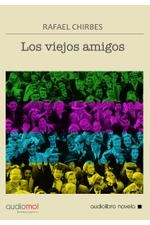 En dos ocasiones anteriores hemos hablado en nuestro blog de Rafael Chirbes, a propósito de títulos como Los disparos del cazador o La buena letra, disponibles a través de nuestra plataforma de descarga de audiolibros. Ahora volvemos de nuevo a él porque probablemente sea este escritor valenciano el autor de mayor prestigio en España en estos momentos.
En dos ocasiones anteriores hemos hablado en nuestro blog de Rafael Chirbes, a propósito de títulos como Los disparos del cazador o La buena letra, disponibles a través de nuestra plataforma de descarga de audiolibros. Ahora volvemos de nuevo a él porque probablemente sea este escritor valenciano el autor de mayor prestigio en España en estos momentos.
Rafael Chirbes recibió el día 22 de enero el Premio Francisco Umbral al mejor libro del año por En la orilla, editado por Anagrama. Este premio se suma además a los elogios de la crítica en diferentes medios. Así por ejemplo, el suplemento cultural Babelia, del diario El País, a través de 56 críticos y periodistas, también concedía a este título el honor de ser la “novela del año”.
Si bien es cierto que hay críticos que aborrecen este tipo de listas y de selecciones del año, nadie discute la calidad de este autor que ya quedó patente con Crematorio (2007), aquel potente retrato de la España de la especulación inmobiliaria y la corrupción asociada a ella.
Nuestro audiolibro de la semana viene firmado por él. Se titula Los viejos amigos y es su séptima novela, anterior justamente a Crematorio. Fue publicada por primera vez en 2003 y cuenta la historia de un grupo de viejos camaradas que estuvieron unidos en el pasado por un proyecto común, aunque poco concreto: la revolución.
¿Sabes cómo descargar este audiolibro? Solo necesitas tu carné de usuario y tu contraseña.
On two previous occasions, we have spoken on our blog about Rafael Chirbes and novels like Los disparos del cazador or La buena letra, both available through our downloading platform for audiobooks and electronic books. Now, we return to the Valencian writer as he is probably the most prestigious author in Spain at the moment.
Rafael Chirbes received on 22nd Jan. the Francisco Umbral Award for best book of the year by En la orilla, published by Anagrama. Before that, 56 critics and journalists from El País and its cultural suplement, Babelia, also gave this title the honor of being the “novel of the year.”
There are critics who abhor such lists of “books of the year”, but no one disputes the quality of Rafael Chirbes, a quality that was made already evident with Crematorio (2007), a powerful portrait of Spain during the years of property speculation and corruption associated to it.
Our audiobook of the week is his seventh novel, Los viejos amigos, written just before Crematorio and published in 2003. Los viejos amigos tells the story of a group of old comrades who were united by a past in common, a joint project: the revolution.
Do you know how to download this audiobook? You just need your library card and your password.
Premios nacionales versus premios comerciales / National Awards vs Launching Pad Awards
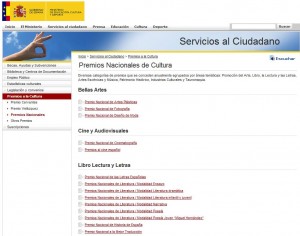 Si la semana pasada hablábamos de los Premios Goya, hoy lo hacemos sobre otro tipo de premios. Premios principalmente literarios, porque la potente industria editorial española, ya a comienzos de enero, pone en marcha toda su maquinaria y comienza a ofrecer titulares de prensa a los lectores ávidos de novedades. Así, el 6 de enero se concede el Premio Nadal, el más antiguo de España con 70 años de historia.
Si la semana pasada hablábamos de los Premios Goya, hoy lo hacemos sobre otro tipo de premios. Premios principalmente literarios, porque la potente industria editorial española, ya a comienzos de enero, pone en marcha toda su maquinaria y comienza a ofrecer titulares de prensa a los lectores ávidos de novedades. Así, el 6 de enero se concede el Premio Nadal, el más antiguo de España con 70 años de historia.
El Premio Nadal, otorgado este año a la escritora española Carmen Amoraga con la novela La vida era eso, presume además de haber marcado con sus títulos buena parte de la literatura española del siglo XX. Entre sus obras ganadoras figuran títulos como Nada, de Carmen Laforet, primera ganadora del premio en 1944, que supuso un revulsivo en la literatura española de posguerra, La sombra del ciprés es alargada de Miguel Delibes en 1947, El Jarama (1955), título después repudiado por su autor, Rafael Sánchez Ferlosio, Entre visillos (1957) de Carmen Martín Gaite, Primera memoria (1959) de Ana María Matute o Un hombre que se parecía a Orestes (1968) de Álvaro Cunqueiro.
Sin embargo, como decía Miguel Aguilar durante la conversación que mantuvimos con él hace unos meses, estos premios comerciales a obra inédita son una peculiaridad de España:
«Creo que hay que distinguir entre los premios que son a obra publicada: el Premio Nacional de Ensayo, Premio Nacional de Literatura, el Premio Salambó, por ejemplo, que se concede en Barcelona… y los premios a obra sin publicar (…). Los premios que se dan a obras sin publicar, hay que considerarlos más bien como una plataforma de lanzamiento, más que como un reconocimiento de una calidad intrínseca. Y como tal, yo creo que sirven para llamar la atención de los lectores sobre una obra determinada».
¿Qué hay entonces de esos «premios nacionales» que menciona Miguel Aguilar?
Estos premios son concedidos cada año por el Ministerio de Educación Cultura y Deporte de España a través de la Subdirección General de Promoción del Libro, la Lectura y las Letras Españolas (SGPLLL), unos premios que «tienen como objetivo estimular la creación literaria» así como reconocer «la labor en pro de la difusión de la cultura de determinadas entidades y profesionales.» Los galardonados en 2013 fueron:
- Premio Nacional de Poesía: Manuel Álvarez Torneiro por Os ángulos da brasa.
- Premio Nacional de Narrativa: José María Merino por El río del Edén.
- Premio Nacional de Ensayo: Santiago Muñoz Machado por Informe sobre España. Repensar el estado o destruirlo.
- Premio Nacional de las letras Españolas: Luis Goytisolo.
- Premio nacional del Comic: Miguelanxo Prado por Ardalén.
- Premio Nacional de Literatura Dramática: Juan Mayorga por La lengua en pedazos.
- Premio Nacional de Literatura Infantil y juvenil: César Mallorquí por La isla de Bowen.
- Premio Nacional de Poesía Joven Miguel Hernández: Unai Velasco por En este lugar.
- Premio Nacional Historia de España: José Ángel Sánchez Asiaín por La financiación de la Guerra Civil española.
- Premio Nacional a la Mejor Traducción: Carmen Montes Cano por Kallocaína.
- Premio Nacional a la Obra de un Traductor: Josu Zabaleta.
- Premio Nacional de Ilustración: Carme Solá.
- Premio Nacional de Periodismo Cultural: Antón Castro.
- Premio Nacional a la Mejor Labor Editorial Cultural: Editorial Turner.
- Premio Nacional de Fomento de la Lectura: Suplemento Cultura/s de La Vanguardia y Asociación de Profesionales de Bibliotecas Móviles (ACLEBIM).
Estos premios son solo una parte de los Premios Nacionales de Cultura, que incluyen también otras áreas como Promoción del Arte, Artes Escénicas y Música, Patrimonio Histórico, Industrias Culturales y Tauromaquia.
En nuestra biblioteca, durante los meses de enero y febrero, te proponemos precisamente una selección de títulos que han sido galardonados, a lo largo de estos últimos años, con premios nacionales o con premios comerciales. Así tú decides cuál es el que te parece mejor.
If last week we talked about the Goya Awards, today we write about literary awards, because the powerful Spanish publishing industry started 2014 offering big news to readers avid of new titles.
The Nadal Prize was awarded a couple of weeks ago to the Spanish writer Carmen Amoraga for her novel La vida era esto. This award has recognized, throughout its seventy years of history, the quality of some of the titles that marked the twentieth century Spanish literature.
Among the winning titles are novels like Nada by Carmen Laforet, winner of the first edition in 1944, La sombra del ciprés es alargada by Miguel Delibes in 1947, El Jarama by Rafael Sánchez Ferlosio in 1955, Entre visillos by Carmen Martín Gaite in 1957, Primera Memoria by Ana Maria Matute in 1959 or Un hombre que se parecía a Orestes by Alvaro Cunqueiro in 1968.
However, as Miguel Aguilar said during his visit to Dublin, these awards to unpublished work are a peculiarity of Spain :
“I think we have to distinguish between awards that are given to books that have already been published: the National Essay Prize, the National Book Award, the Salambó Award, for example, awarded in Barcelona… and awards for unpublished work (…). The awards given to unpublished works are to be regarded as a launching pad, rather than a recognition of an intrinsic quality. In this way, I think they suceed in drawing the attention of readers to a particular work”.
Ok then, what about these “National Awards” mentioned Miguel Aguilar ?
In Spain, these awards are given each year by the Ministry of Education, Culture and Sports (MECD) through the Subdirección General de Promoción del Libro, la Lectura y las Letras Españolas (SGPLLL). These awards “aim to stimulate creative writing” as well as to recognize the role of institutions and professionals in disseminating culture..
The winners in 2013 are listed above.
These awards are just part of the National Awards for Culture, which also include other areas like Arts, Music, Cultural Industries or Bullfighting.
In our library, during the months of January and February, we bring you a selection of titles and authors that have been awarded, over recent years, with National Awards or with “launching pad awards”. Then you decide which one you like best.
Mariposas en la nieve. Nuestro audiolibro de la semana / Audiobook of the week
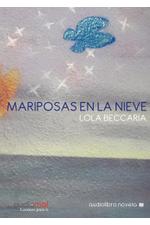 Mariposas en la nieve es la cuarta novela de la escritora española Lola Beccaria. Publicada inicialmente por la editorial Anagrama en 2006, hoy te la ofrecemos a través de nuestra plataforma de descarga de audiolibros y videocuentos, donde tienes a tu disposición cientos de títulos para todos los gustos.
Mariposas en la nieve es la cuarta novela de la escritora española Lola Beccaria. Publicada inicialmente por la editorial Anagrama en 2006, hoy te la ofrecemos a través de nuestra plataforma de descarga de audiolibros y videocuentos, donde tienes a tu disposición cientos de títulos para todos los gustos.
Mariposas en la nieve es una novela llena de símbolos y de misterio, de lirismo y también de nostalgia, porque nos habla de esa difícil tarea que resulta ser para todos dejar de ser niños y crecer para convertirse en adultos.
La protagonista de esta historia, una joven pianista, se pierde por carreteras secundarias que la llevan a un misterioso pueblo en la sierra, habitado por niños tristes con padres convencionales que son incapaces de comunicarse con ellos.
Pero allí vive también una niña diferente, una niña libre que juega con alegría y que nos hace reflexionar sobre si es necesario renunciar a nuestros sueños para llegar a ser alguien en la vida o si, precisamente por esa renuncia, acabaremos por ser alguien que nada tenga que ver con nosotros mismos.
Ya sabes, para escucharlo, solo necesitas tu carné de usuario y tu contraseña.
Mariposas en la nieve is the fourth novel by Spanish writer Lola Beccaria . First published by Anagrama Publishing House, in 2006, now we offer it to you through our audiobooks and video-tales platform , where you can find hundreds of titles to suit all tastes .
Mariposas en la nieve is a novel full of symbols and mystery, lyricism and nostalgia , because it tells us about the difficult task of becoming and adult.
The protagonist of this story , a young pianist, gets lost in a secondary road that leads to a mysterious village in the mountains, inhabited by sad children with conventional parents who are unable to communicate with them.
But there also lives a different girl, a girl full of joy who makes us to consider whether it is necessary to give up our dreams to become a grown-up.
To enjoy this novel, you just need your library card and your password. Happy weekend!
Historia de un amor turbio: Audiolibro de la semana / Audiobook of the week
Historia de un amor turbio es la primera novela del autor uruguayo Horacio Quiroga. Una novela inquietante, como todos los cuentos de Quiroga, en la que se narra la historia de amor entre un hombre y dos hermanas. El joven Rohán flirtea con ambas y es difícil saber a cuál de las dos desea realmente, si a Eglé o a su hermana. Esa circunstancia provoca celos y situaciones incómodas en el transcurso de la narración que arrastran al lector hacia un final difícil de prever.
¿Cuál será finalmente la elegida? Para descubrirlo solo es neceario que tengas a mano tu tarjeta de usuario de la biblioteca y tu contraseña.
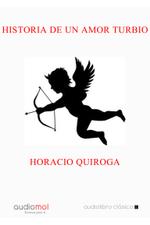
Historia de un amor turbio is the title of the first novel by Uruguayan author Horacio Quiroga. A haunting novel (like all Quiroga’s stories) that tells the love story between a man and two sisters. A young man, Rohán, flirts with both and it’s hard to know which one he really desires. This circumstance causes jealousy and uncomfortable situations that lead the reader towards an unpredictable end.
Who will be finally the chosen one? To discover it, you just need to have on hand your library card and your password.
Elena Poniatowska, nuestra autora del mes / author of the month
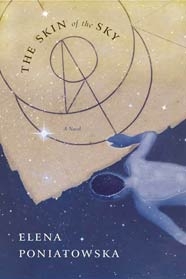
Elena Poniatowska es escritora y periodista mexicana, autora de más de 40 libros traducidos a más de 20 idiomas.
Nacida en París, en 1932, de padre francés de origen polaco y de madre mexicana, emigró a México con su familia, cuando tenía 10 años, para escapar de la Segunda Guerra Mundial.
Elena Poniatowska comenzó a escribir para el diario mexicano Excélsior a la edad de 18 años, haciendo entrevistas y columnas de sociedad. Sin embargo, su escritura pronto derivó hacia temas más sociales y políticos que se vieron reflejados en sus artículos de prensa, ensayos, novelas, relatos y libros para niños.
Quizás su obra más conocida sea La noche de Tlatelolco (publicada en inglés como Massacre in Mexico), que trata de la matanza de estudiantes mexicanos por parte de las fuerzas de seguridad durante las protestas estudiantiles que tuvieron lugar en Ciudad de México en 1968.
Otros títulos publicados por Elena Poniatowska son Hasta no verte, Jesús mío (Here’s to you, Jesusa!) que relata la vida de una mujer trabajadora a comienzos de siglo en México, y La piel del cielo (The Skin of the Sky), que narra la vida de Lorenzo de Tena, un brillante astrónomo mexicano, personaje basado en la historia real del marido fallecido de la autora, el astrónomo mexicano Guillermo Haro.
El pasado mes de noviembre, Elena Poniatowska fue galardonada con el Premio Cervantes, el premio más importante de las letras en español, por su «brillante trayectoria literaria en diversos géneros, de manera particular en la narrativa y en su dedicación ejemplar al periodismo». De este modo, el Premio Cervantes reconoce a «una de las voces mas poderosas de la literatura en español de estos días».
Todas ellas son buenas razones para hacer de Elena Poniatowska nuestra autora del mes en enero y febrero. ¿No te parece? Sus libros te están esperando en nuestra biblioteca.
Elena Poniatowska is a Mexican journalist and writer, the author of more than 40 books translated into more than 20 languages. She was born in Paris in 1932 to a Polish-French father and a Mexican mother, but she left France for Mexico, where she lives since then, when she was ten years old, to escape the Second World War.
Poniatowska began writing for the Mexican newspaper Excélsior when she was 18, doing interviews and society columns, but later she evolved to writing about social and political issues in newspapers and books, highlighting the problems of the poor.
She has written novels, journalistic essays, children’s books and short stories. Her best known work is La noche de Tlatelolco (The night of Tlatelolco, the English translation was titled “Massacre in Mexico”), an account of the killing of student protesters in Mexico City by the security forces in 1968.
Other titles by Elena Poniatowska published in English are Here’s to you, Jesusa! which portrays the life of a working class woman in early 20th century Mexico, and The Skin of the Sky, the fascinating story of the life of Lorenzo de Tena, a brilliant Mexican astronomer. This novel is based in the life of her late husband, the Mexican astronomer Guillermo Haro.
Last November, Elena Poniatowska won the Cervantes Prize, the highest literary honour in the Spanish-speaking world for her “brilliant” literary career and her “exemplary” dedication to journalism, based on a “firm commitment to contemporary history,” as “one of the most powerful voices in the Spanish-language literature of our times.”
These are all good reasons for making Elena Poniatowska our author of the month in January and February. Don’t you think so? Her books are waiting for you in our library.
Audiobook of the week / Audiolibro de la semana: La luz prodigiosa
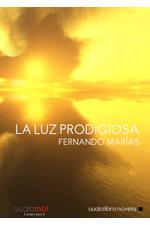 ¿Murió Federico García Lorca realmente en 1936? Esa es la pregunta que se hace el escritor Fernando Marías en su novela La luz prodigiosa, nuestro audiolibro de la semana.
¿Murió Federico García Lorca realmente en 1936? Esa es la pregunta que se hace el escritor Fernando Marías en su novela La luz prodigiosa, nuestro audiolibro de la semana.
Lo cierto es que jamás se encontraron sus restos, que sólo conocemos lo sucedido de forma fragmentaria y que aún faltan muchas piezas que juntar en el siniestro rompecabezas de su desaparición.
En La luz prodigiosa, la respuesta a esta pregunta va surgiendo, poco a poco, en boca de un viejo vagabundo y borracho, el mismo que hace cincuenta años encontró por casualidad a un joven moribundo tirado al borde de un camino y, sin conocer su identidad, le salvó la vida. ¿Qué fue a partir de entonces de aquel joven? ¿De qué manera sobrevivió a la guerra? ¿Por qué estos hechos quedaron olvidados hasta hoy?
La novela de Fernando Marías fue adaptada al cine en 2003 con notable éxito. Ahora, para escucharla, solo necesitas tu carné de biblioteca y tu contraseña.
Did Federico García Lorca die in 1936? That’s the question that Spanish writer Fernando Marías puts to us in his novel La luz prodigiosa, our audiobook of the week.
The truth is that his remains were never found. We only know what happened in a piecemeal and there are still many pieces missing in the puzzle of his sinister disappearance.
In La luz prodigiosa, the answer to this question emerges slowly from an old man, tramp and drunk. The same man that fifty years ago saved the live of a dying young man he discovered on the edge of a road, not even knowing his identity. What happened thereafter to that young man? How he survived the war? Why these facts were forgotten until today?
Fernando Marías‘s novel was adapted into a film in 2003 with remarkable success. Now, to listen to the audiobook version, you just need your library card and your password.
Álvaro Mutis: uno de los grandes / one of the greatest American writers

Álvaro Mutis era uno de los grandes. Nacido en Colombia, en 1923, su vida transcurrió entre el trópico y las ciudades del viejo continente. Recorrió los mares, pero en su memoria quedaron grabados los cafetales, los cañaduzales y los ríos turbulentos que alcanzan dimensiones míticas en su poesía. De ese paisaje, precisamente, emerge su personaje Maqroll, a través del cual Mutis nos ofrece lo que ha sido su aventura de vivir.
En el año 2001, el escritor colombiano fue galardonado con el Premio Cervantes por su aportación a la literatura en lengua española. el pasado mes de septiembre, falleció en Ciudad de México a los noventa años. Este es nuestro pequeño homenaje. Álvaro Mutis es nuestro autor del mes en noviembre y diciembre.
- Álvaro Mutis en las bibliotecas del Instituto Cervantes.
- Álvaro Mutis en el Centro Virtual Cervantes.
Álvaro Mutis was one of the greatest Latin American writers. Born in Colombia, in 1923, he spent his life between the tropics and European cities. He traveled the seas, but the cane fields and turbulent rivers that reach mythic dimensions in his poetry were always etched in his memory. His main character, Maqroll, emerges from this landscape. Through his adventures, Mutis brings us his own adventures.
In 2001, the Colombian writer was awarded the Cervantes Prize for his contribution to literature in Spanish. Last September, Álvaro Mutis died in Mexico City. This is our small tribute to him. Álvaro Mutis is our author of the month in November and December.
Historia del llanto. Audiolibro de la semana / Audiobook of the Week
Historia del llanto, del escritor argentino Alan Pauls, es el audiolibro que hemos seleccionado esta semana para ti. Una semana en la que se ha hablado mucho de Chile, donde el domingo pasado se celebró la primera vuelta de las elecciones a la presidencia. Una novela que, precisamente, está ambientada en el contexto histórico del golpe de estado chileno.
La novela narra la historia de un niño que se hace adolescente en la Argentina de los años 70. Un niño muy sensible y aficionado a leer las aventuras de Superman.
Nuestro protagonista tiene la habilidad de hacer que los adultos destapen su alma en su presencia y, además, tiene una enorme facilidad para llorar. Una facultad que, sin embargo, pierde a los 13 años, cuando se enfrenta a la crudeza de las imágenes de la toma de la Casa de la Moneda en Chile. El adolescente no llora, no puede hacerlo, y esto hace que comience a plantearse muchas preguntas.
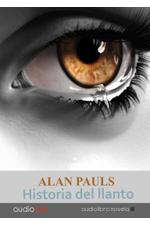
Para descargar este audiolibro solo necesitas tener lista tu tarjeta de biblioteca y tu contraseña.
Historia del llanto, by Alan Pauls, is the novel we selected for you as audiobook of the week. This novel, set in the historical context of the Chilean coup d’etat in 1973, tells the story of a child who becomes a teenager during the 70’s in Argentina. A very sensitive child, fan of Superman comics.
Our protagonist has the ability to make people uncover their soul in his presence. He is also very easy for crying. However, when faced with the rawness of the pictures of the Casa de la Moneda bombing by the Pinochet forces, our teenager does not cry. He is not able to do it, and this arises many questions inside him.
The downloading of this audiobook only requieres your library membership card and your password.
31 noches. Ignacio Escolar
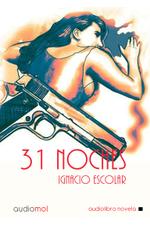 Dicen que el periodismo está en crisis, que Internet, las redes sociales, y la moda del «todo gratis» ponen en peligro el papel de los periódicos (y los periódicos de papel) como canalizadores de información. Dicen que con ello también se pone en duda el papel del periodista, que periodistas, al fin y al cabo, somos todos y que para ello basta con tener un blog o una cuenta en Twitter.
Dicen que el periodismo está en crisis, que Internet, las redes sociales, y la moda del «todo gratis» ponen en peligro el papel de los periódicos (y los periódicos de papel) como canalizadores de información. Dicen que con ello también se pone en duda el papel del periodista, que periodistas, al fin y al cabo, somos todos y que para ello basta con tener un blog o una cuenta en Twitter.
Sin embargo, los periodistas siempre han sido muy valorados por los escritores como personajes literarios, especialmente por los autores de novela negra.
En 31 noches, nuestro audiolibro de la semana, será precisamente un periodista, infiltrado por la policía en una banda de narcotraficantes, el que se vea inmerso en una historia en la se mezclan drogas y asesinatos.
31 noches es la primera novela de Ignacio Escolar, otro periodista, pero no uno cualquiera. Tiene blog, tiene twitter, fue el primer director del diario Público y actualmente dirige Eldiario.es.
¿Tienes a mano tu carné de biblioteca y tu contraseña? Entonces ya puedes descargar 31 noches.
It’s said that journalism is in crisis, that the Internet and social networks jeopardize the role of newspapers as the main conduit of information. It’s said that this also puts into question the role of journalists, that we all are journalists if we have a blog or a Twitter account.
However, journalists have always been highly valued by writers as literary characters , especially by the authors of detective novels .
In 31 noches, our audiobook of the week, it’s precisely a journalist, infiltrated by police in a drug ring, the main caracter of the novel who gets involved in a story of drugs and murder.
31 noches is the first novel by Ignacio Escolar, another journalist, but not just any . He has a blog, he has a twitter account, and he was the first director of the newspaper Público. Currently, he is the director of Eldiario.es.
Do you have on hand your library card and your password? Then you can download 31 noches right now!
Festival Isla 2013, ¿repetimos? / Isla Festival 2013,once again?
Hace poco menos de un mes celebrábamos, en el Instituto Cervantes de Dublín, la segunda edición del Festival Isla de literatura. Ahora te ofrecemos todos los videos de las mesas redondas, las lecturas y las entrevistas que hicimos a los autores en nuestra biblioteca a través de nuestro canal de video.

Quizás te perdiste alguna mesa, quizás vivas fuera de Dublín y no pudiste asistir a ninguna de ellas, quizás quieras aprovechar los vídeos para disfrutar una vez más de la buena literatura, o es posible incluso que seas profesor de español y te interese utilizarlos en tus clases. Porque ya hemos subtitulados muchos de ellos en español. De modo que no hay excusa. Hay mil razones para verlos. Los tienes a tu disposición, mientras nosotros seguimos preparando la tercera edición del festival que se celebrará en noviembre de 2014.
Ahora, por cierto, es un buen momento para hacernos llegar tus sugerencias. ¿A qué escritor te gustaría ver en Dublín?, ¿qué crees que deberíamos cambiar en el festival?, ¿qué podríamos mejorar? Tu opinión es importante. ¡Escríbenos. Ya sabes dónde estamos!
A few weeks ago, we celebrated our Isla Festival of literature at the Instituto Cervantes in Dublin. Now, you can watch all the videos of the roundtable discussions, the literary readings and the interviews we did in our library. They are all available on our video channel .
Perhaps you missed a reading, maybe you live outside Dublin and could not attend any of them , or maybe you want to enjoy once again the taste of good literature. They are good even for practising your Spanish, as many of the videos are already subtitled. So there is no excuse . There are a thousand reasons to see them, while we continue preparing the third edition of the festival to be held in November 2014.
Now, of course , is a good time to send us your suggestions . What writer would you like to meet in Dublin?, what do you think we should improve or change for the next year. Your opinion is important so, write to us! We are more than happy to receive your feedback!
Audiolibro de la semana / Audiobook of the week: Seda salvaje
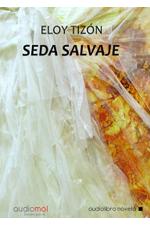 Eloy Tizón ha sido noticia esta semana porque acaba de publicar nuevo libro: Técnicas de iluminación, un libro de cuentos que ha merecido, por cierto, muy buenas críticas.
Eloy Tizón ha sido noticia esta semana porque acaba de publicar nuevo libro: Técnicas de iluminación, un libro de cuentos que ha merecido, por cierto, muy buenas críticas.
Ya en el mes de marzo, os proponíamos como audiolibro de la semana Parpadeos, otro título de este autor. Pues bien, hoy os proponemos otro título más, Seda salvaje, que esperamos que os guste tanto o más que el primero. También tenéis en la biblioteca, a vuestra disposición, algunas obras en papel de este autor madrileño.
Seda salvaje es una novela centrada en una obsesión, la del protagonista hacia la vida de las demás personas, que imagina repletas de secretos, conspiraciones, traumas…, lo que él denomina «la música del prójimo», que es la cara oculta tras la fachada. Con la ayuda de un detective privado, nuestro protagonista someterá a vigilancia a su novia, sobre la que empezará a descubrir cosas raras, a veces reales, otras fantaseadas… Y hasta aquí podemos leer. Si quieres saber más, descarga tu audiolibro con tu carné de biblioteca y tu contraseña. ¡A disfrutar!
Eloy Tizón has just published a new book, Técnicas de iluminación, which has certainly been very well received by critics and the public.
Back in March , we proposed you Parpadeos as audiobook of the week, another title by this author. Today, to celebrate the publishing of his new book, we bring you another title , Seda salvaje, a novel we hope you will enjoy as much as Parpadeos. In our library, you also have some paper books by this author from Madrid.
Seda salvaje is a novel centered on an obsession. The obsession of the main character of the novel, a guy that imagines the lives of other people full of secrets and conspiracies. With the help of a detective, our protagonist follows his own girlfriend and discovers strange things about her. But are they real or fantasized? If you want to know more, just download your audiobook with your library card and your password. Enjoy!
Audiolibro de la semana / Audiobook of the week: El asesinato de Johann Sebastian Bach
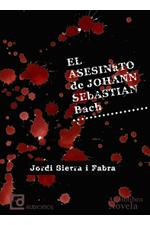 Hablamos de muertos, de asesinatos, de historias de terror, ya que celebramos hoy el Día de los Muertos, y sobre este asunto, para prolongar durante este fin de semana las emociones que nos trajo Halloween, os proponemos esta semana, El asesinato de Johann Sebastian Bach, una historia de misterio del multipremiado autor catalán Jordi Sierra i Fabra en la que, tal como se anuncia en nuestra plataforma de descarga de audilibros «el glamour puede transformarse en terror».
Hablamos de muertos, de asesinatos, de historias de terror, ya que celebramos hoy el Día de los Muertos, y sobre este asunto, para prolongar durante este fin de semana las emociones que nos trajo Halloween, os proponemos esta semana, El asesinato de Johann Sebastian Bach, una historia de misterio del multipremiado autor catalán Jordi Sierra i Fabra en la que, tal como se anuncia en nuestra plataforma de descarga de audilibros «el glamour puede transformarse en terror».
En El asesinato de Johann Sebastian Bach, Daniel Ros, su protagonista, descubre en un piso frente al suyo el cuerpo destripado de su vecina. Pocos minutos después, Daniel conoce a Julia, una chica muy atractiva que dice ser prima de la víctima. Daniel decide entonces comenzar su propia investigación y descubre, poco a poco, que detrás del oficio de modelo de su vecina Laura, esta escondía una vida mucho menos fascinante y más terrible de lo que podía imaginar.
Ya sabes, para descargar este audiolibro y comenzar a disfrutar de él solo necesitas tener a mano tu carné de biblioteca y tu contraseña. ¡Que tengas un fin de semana terroríficamente feliz!
We speak of the dead, we talk about murders and horror stories as we celebrate the Day of the Dead and, on this issue, to extend to this weekend the emotions of Halloween, we suggest a story full of mystery as our audiobook of the week.
In El asesinato de Johann Sebastian Bach, written by the multi awarded catalan writer Jordi Sierra i Fabra, Daniel Ros, a young journalist, discovers the disemboweled body of his neighbor, who seems to have been the victim of a sadist. A few minutes later, Daniel meets Julia, an attractive girl who claims to be the victim’s cousin. Then Daniel decides to start his own research and discover, little by little, that behind his neighbor’s job as a model, she hid a life much less fascinating and much more terrible.
To download this audiobook and start enjoying it, you just need your library card and your password. Have a terrific and mysterious weekend!
Preparando el Festival Isla 2014 / Preparing Isla Festival 2014
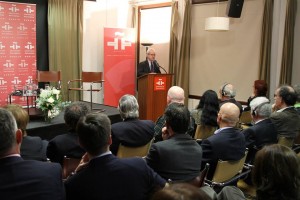 Durante este fin de semana, hemos celebrado la segunda edición del Festival Isla de Literatura. Por segundo año consecutivo, Irlanda, Latinoamérica y España se encontraron en el Instituto Cervantes de Dublín para hablar de la literatura y sus alrededores.
Durante este fin de semana, hemos celebrado la segunda edición del Festival Isla de Literatura. Por segundo año consecutivo, Irlanda, Latinoamérica y España se encontraron en el Instituto Cervantes de Dublín para hablar de la literatura y sus alrededores.
Una vez más, queremos agradecer desde aquí el apoyo y la colaboración de instituciones como Dublin UNESCO City of Literature, Ireland Literature Exchange, el Instituto Vasco Etxepare, Poetry Ireland, y cómo no, a la inestimable aportación de Dublin City University, National University of Ireland in Galway, National University of Ireland in Maynooth. Trinity College Dublin, y University College Cork. Muchísimas gracias a todos ellos.
Como dijera Rosa León, directora del Instituto Cervantes de Dublín durante su discurso de inauguración, «tenía que ser aquí, en esta isla esmeralda, donde naciera y creciera nuestro festival, donde la semilla de nuestro esfuerzo diera sus frutos. En esta misma tierra donde tantos genios de la literatura cavaron antes con su pluma para fecundarla y enriquecerla, para hacerla abierta, acogedora y libre.
Porque la gran riqueza de Irlanda es su cultura y su maravillosa tradición literaria, y esa poderosa fuerza se da la mano aquí, en este festival, con la fuerza del español, con quinientos millones de seres humanos en cuatro continentes, con la segunda lengua de comunicación a nivel internacional».
Rosa León recordó también las hermosas palabras del presidente Michael D. Higgins durante su discurso en 2012 y, como no, tuvo de palabras de cariño y reconocimiento hacia Seamus Heaney, cuya presencia estaba prevista en el festival desde antes del verano. Sus poemas, los mismos que él había elegido para su lectura durante el Festival Isla, se hicieron presentes en la sala gracias a la voz del actor irlandés Tom Hickey.
Finalmente, Rosa León cedió la palabra a otro gran amigo de Seamus y del propio Instituto Cervantes, el gran escritor irlandés John Banville, que «de forma amabilísima y desinteresadamente atendió la llamada del Instituto Cervantes para cubrir la ausencia de Seamus Heaney».
John Banville, en su intervención, recordó la impresión que le había causado, en su primera visita a España, un hombre a caballo en la isla de Mallorca. También recordó su visita a América del Sur para visitar la casa de la madre de Thomas Mann y nos hizo reflexionar, de este modo, sobre la universalidad de la literatura. Muchísimas gracias, John, por tu generosidad.
Esperamos que todos hayais disfrutado del Festival y esperamos también recibir vuestras sugerencias y aportaciones, para mejorar en lo que sea posible en la edición del Festival Isla de 2014 que hoy mismo comenzamos a preparar.
Las fotos del festival están ya disponibles en nuestra página de Facebook.
Los vídeos del Festival estarán muy pronto disponibles en nuestro canal de Youtube.
During last weekend , we celebrated the 2nd Isla Literary Festival . For the second year in a row , Ireland , Latin America and Spain joined at the Instituto Cervantes in Dublin to talk about literature and its surroundings.
Once again , we thank the support and collaboration of institutions such as Dublin UNESCO City of Literature, Ireland Literature Exchange , Instituto Vasco Etxepare, Poetry Ireland, and of course, the invaluable contribution of Dublin City University, National University of Ireland in Galway, National University of Ireland in Maynooth, Trinity College Dublin, and University College Cork. Many thanks to all of them.
As Rosa Leon, director of Instituto Cervantes in Dublin, said during her speech , “our Festival had to be born in here , in the Emeral Isle. On this same land where many geniuses of literature dug with their pens to fertilize and to enrich it , to make it an open land, free and welcoming.
Because the rich of Ireland is its culture and its wonderful literary tradition, and that powerful force joins hands here, in this festival, with the strength of the Spanish language, with half a billion of human beings on four continents , with the second language of international communication.”
Rosa Leon recalled as well the beautiful words of President Michael D. Higgins during his speech in 2012 and she had words of love and gratitude to Seamus Heaney, whose presence was expected at the Festival since before summer . His poems , the same poems he had chosen for reading during the Isla Festival, were present in the official opening thanks to the voice of the Irish actor Tom Hickey.
Finally , Rosa León gave the floor to another great friend of Seamus and Instituto Cervantes , the great Irish writer John Banville , who “so lovable and unselfishly answered our call to cover the absence of Seamus Heaney.”
John Banville recalled the impression that a man riding a horse in Mallorca made on him during his first visit to Spain. He also mentioned his trip to South America, to visit the house of Thomas Mann‘s mother and, in this way, he made us reflect on the universality of literature. Thank you , John , for your generosity .
We hope you all have enjoyed the Festival as much as we did, and we look forward to receiving your suggestions and contributions to improve, as best as we can, the 3rd edition of our Isla Festival that we start preparing today.
The photos of the Isla Festival 2013 are now available on our Facebook page .
The videos of the interviews we prepare will soon be available on our YouTube channel.
Audiolibro de la semana / Audiobook of the week: Vidas perpendiculares
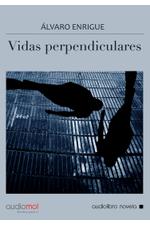
En Vidas perpendiculares, el autor Álvaro Enrigue nos cuenta la historia de Jerónimo Rodríguez, cuyos rasgos físicos son iguales a los de un típico chico mexicano. Sin embargo, al mismo tiempo, Jerónimo tiene la habilidad de sentir los miedos de su padre cuando está cerca de él, y puede recordar cuáles eran sus sentimientos cuando vivía con una tribu prehistórica o cuando vivía en el siglo XVII en Italia. El autor escribe todas estas vidas pasadas y la presente con un nexo de unión entre todas, la búsqueda del amor.
Si lo prefieres, la versión impresa de este libro también está a tu disposición en nuestra biblioteca.
Álvaro Enrigue participa mañana sábado en nuestro Festival Isla de Literatura, mañana sábado, a las 4.30 de la tarde.
In Vidas Perpendiculares Álvaro Enrique tells us about the life of Jerónimo Rodríguez Loera. He looks apparently like a typical mexican boy, but he is able to feel his father’s fears when he is close to him, and to remember all his past lives.
If you prefer reading than listening, there is a printed version of this book available in our library.
Álvaro Enrigue participates in our Isla Literary Festival, tomorrow at 4.30pm.
No solo de mesas vive el Festival Isla de Literatura / It’s not just about round table discussions
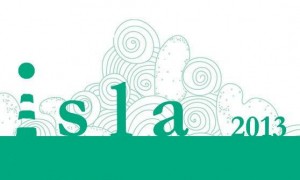 No, en el Festival Isla no solo hay mesas redondas.
No, en el Festival Isla no solo hay mesas redondas.
A lo largo de las últimas semanas hemos estado desgranando en estas páginas los detalles de las mesas redondas que conforman el Festival Isla de Literatura. Pero nuestro festival es mucho más que eso, porque además tendrás la oportunidad de asistir a lecturas en inglés y en español de textos de poesía y narrativa, leídos por sus propios autores, tendrás la posibilidad de comprar sus libros, y tendrás la ocasión de tomarte un café y un tentempié en nuestra sala de exposiciones. Allí mismo podrás encontrarte con los autores que participan en el evento y pedirles que firmen tu ejemplar.
Disfruta de la literatura, en todos los sentidos, en compañía de René Vázquez, Daniel Freidemberg, Tomás Mac Síomóin, Paula Meehan, Kirmen Uribe, Enrique Vila-Matas, John Banville, Eileen Battersby, John Boyne, Julio Espinosa, Álvaro Enrigue, María Tena, Fernando Sánchez Dragó, Marina Carr, Susana Cella y Manuel Gutiérrez Aragón. Estás avisado. ¡Allá tú si te lo pierdes!
No. Isla Festival of Literature is not just about round table discussions.
Over the last few weeks, we have been showing in these pages the details of the round table discussions that will be held during our Festival Isla of Literature. But our festival is much more than that, because you will also have the opportunity to join our readings of poetry and fiction, with texts read by the authors themselves. You will have the occasion to buy their books, and to take a coffee and a snack in our exhibition room. Right there, you can meet the authors participating in the event and ask them to sign your copy.
Enjoy the best literature in the company of René Vázquez, Daniel Freidemberg, Tomás Mac Síomóin, Paula Meehan, Kirmen Uribe, Enrique Vila-Matas, John Banville, Eileen Battersby, John Boyne, Julio Espinosa, Álvaro Enrigue, María Tena, Fernando Sánchez Dragó, Marina Carr, Susana Cella and Manuel Gutiérrez Aragón. You are warned! Don’t miss it!


